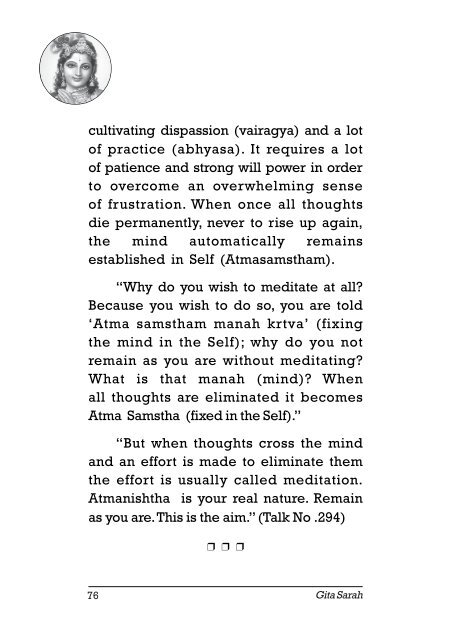Gita-Sarah-Commentary-on-the-Slokas-of-Bhagavad-Gita
Gita-Sarah-Commentary-on-the-Slokas-of-Bhagavad-Gita
Gita-Sarah-Commentary-on-the-Slokas-of-Bhagavad-Gita
You also want an ePaper? Increase the reach of your titles
YUMPU automatically turns print PDFs into web optimized ePapers that Google loves.
cultivating dispassi<strong>on</strong> (vairagya) and a lot<strong>of</strong> practice (abhyasa). It requires a lot<strong>of</strong> patience and str<strong>on</strong>g will power in orderto overcome an overwhelming sense<strong>of</strong> frustrati<strong>on</strong>. When <strong>on</strong>ce all thoughtsdie permanently, never to rise up again,<strong>the</strong> mind automatically remainsestablished in Self (Atmasamstham).“Why do you wish to meditate at all?Because you wish to do so, you are told‘Atma samstham manah krtva’ (fixing<strong>the</strong> mind in <strong>the</strong> Self); why do you notremain as you are without meditating?What is that manah (mind)? Whenall thoughts are eliminated it becomesAtma Samstha (fixed in <strong>the</strong> Self).”“But when thoughts cross <strong>the</strong> mindand an effort is made to eliminate <strong>the</strong>m<strong>the</strong> effort is usually called meditati<strong>on</strong>.Atmanishtha is your real nature. Remainas you are. This is <strong>the</strong> aim.” (Talk No .294)76<str<strong>on</strong>g>Gita</str<strong>on</strong>g> <str<strong>on</strong>g>Sarah</str<strong>on</strong>g>


